- Home
- Charles de Lint
The Newford Stories Page 3
The Newford Stories Read online
Page 3
“Tell me,” Jilly said. “Where did common sense ever get you?”
Heather sighed. “Things don’t happen just because we want them to,” she said.
“Sometimes that’s exactly why they happen,” Jilly replied. “They happen because we need them to.”
“I don’t live in that kind of a world.”
“But you could.”
Heather looked across the kitchen at her daughters once more. The girls were watching her, trying to make sense out of the one-sided conversation they were hearing. Heather wished them luck. She was hearing both sides and that didn’t seem to help at all. You couldn’t simply reinvent your world because you wanted to. Things just were how they were.
“Just think about it,” Jilly added. “Will you do that much?”
“I…”
That bleak landscape inside Heather seemed to expand, growing so large there was no way she could contain it. She focused on the faces of her daughters. She remembered the crow girls in the café. There was so much innocence in them all, daughters and crow girls. She’d been just like them once and she knew it wasn’t simply nostalgia colouring her memory. She knew there’d been a time when she lived inside each particular day, on its own and by itself, instead of trying to deal with all the days of her life at once, futilely attempting to reconcile the discrepancies and mistakes.
“I’ll try,” she said into the phone.
They said their goodbyes and Heather slowly cradled the receiver.
“Who was that, Mom?” Casey asked.
Heather looked out the window. The snow was still falling, muffling the world. Covering its complexities with a blanket as innocent as the hope she saw in her daughters’ eyes.
“Jilly,” she said. She took a deep breath, then smiled at them. “She was calling to tell me that today really is a snow day.”
The happiness that flowered on their faces helped ease the tightness in her chest. The grey landscape waiting for her there didn’t go away, but for some reason, it felt less profound. She wasn’t even worried about what her boss would say when she called to tell him she wouldn’t be in today.
* * *
Crow girls can move like ghosts. They’ll slip into your house when you’re not home, sometimes when you’re only sleeping, go walking spirit-soft through your rooms and hallways, sit in your favourite chair, help themselves to cookies and beer, borrow a trinket or two which they’ll mean to return and usually do. It’s not break-and-enter so much as simple curiosity. They’re worse than cats.
Privacy isn’t in their nature. They don’t seek it and barely understand the concept. Personal property is even more alien. The idea of ownership—that one can lay proprietary claim to a piece of land, an object, another person or creature—doesn’t even register.
“Whatcha looking at?” Zia asks.
They don’t know whose house they’re in. Walking along on the street, trying to catch snowflakes on their tongues, one or the other of them suddenly got the urge to come inside. Upstairs, the family sleeps.
Maida shows her the photo album. “Look,” she says. “It’s the same people, but they keep changing. See, here’s she’s a baby, then she’s a little girl, then a teenager.”
“Everything changes,” Zia says. “Even we get old. Look at Crazy Crow.”
“But it happens so fast with them.”
Zia sits down beside her and they pore over the pictures, munching on apples they found earlier in a cold cellar in the basement.
Upstairs, a father wakes in his bed. He stares at the ceiling, wondering what woke him. Nervous energy crackles inside him like static electricity, a sudden spill of adrenaline, but he doesn’t know why. He gets up and checks the children’s rooms. They’re both asleep. He listens for intruders, but the house is silent.
Stepping back into the hall, he walks to the head of the stairs and looks down. He thinks he sees something in the gloom, two dark-haired girls sitting on the sofa, looking through a photo album. Their gazes lift to meet his and hold it. The next thing he knows, he’s on the sofa himself, holding the photo album in his hand. There are no strange girls sitting there with him. The house seems quieter than it’s ever been, as though the fridge, the furnace and every clock the family owns are holding their breath along with him.
He sets the album down on the coffee table, walks slowly back up the stairs and returns to his bed. He feels like a stranger, misplaced. He doesn’t know this room, doesn’t know the woman beside him. All he can think about is the first girl he ever loved and his heart swells with a bittersweet sorrow. An ache pushes against his ribs, makes it almost impossible to breathe.
What if, what if…
He turns on his side and looks at his wife. For one moment her face blurs, becomes a morphing image that encompasses both her features and those of his first true love. For one moment it seems as though anything is possible, that for all these years he could have been married to another woman, to that girl who first held, then unwittingly, broke his heart.
“No,” he says.
His wife stirs, her features her own again. She blinks sleepily at him.
“Wha…?” she mumbles.
He holds her close, heartbeat drumming, more in love with her for being who she is than he has ever been before.
Outside, the crow girls are lying on their backs, making snow angels on his lawn, scissoring their arms and legs, shaping skirts and wings. They break their apple cores in two and give their angels eyes, then run off down the street, holding hands. The snowdrifts are undisturbed by their weight. It’s as though they, too, like the angels they’ve just made, have wings.
* * *
“This is so cool,” Casey tells her mother. “It really feels like Christmas. I mean, not like Christmases we’ve had, but, you know, like really being part of Christmas.”
Heather nods. She’s glad she brought the girls down to the soup kitchen to help Jilly and her friends serve a Christmas dinner to those less fortunate than themselves. She’s been worried about how her daughters would take the break from tradition, but then realized, with Peter gone, tradition is already broken. Better to begin all over again.
The girls had been dubious when she first broached the subject with them—“I don’t want to spend Christmas with losers,” had been Casey’s first comment. Heather hadn’t argued with her. All she’d said was, “I want you to think about what you just said.”
Casey’s response had been a sullen look—there were more and more of these lately—but Heather knew her own daughter well enough. Casey had stomped off to her room, but then come back half an hour later and helped her explain to Janice why it might not be the worst idea in the world.
She watches them now, Casey having rejoined her sister where they are playing with the homeless children, and knows a swell of pride. They’re such good kids, she thinks as she takes another sip of her cider. After a couple of hours serving coffee, tea and hot cider, she’d really needed to get off her feet for a moment.
“Got something for you,” Jilly says, sitting down on the bench beside her.
Heather accepts the small, brightly-wrapped parcel with reluctance. “I thought we said we weren’t doing Christmas presents.”
“It’s not really a Christmas present. It’s more an everyday sort of a present that I just happen to be giving you today.”
“Right.”
“So aren’t you going to open it?”
Heather peels back the paper and opens the small box. Inside, nestled in a piece of folded Kleenex, are two small silver earrings cast in the shapes of crows. Heather lifts her gaze.
“They’re beautiful.”
“Got them at the craft show from a local jeweler. Rory Crowther. See, his name’s on the card in the bottom of the box. They’re to remind you—”
Heather smiles. “Of crow girls?”
“Partly. But more to remember that this—” Jilly waves a hand that could be taking in the basement of St. Vincent’s, could be taking in the w
hole world. “It’s not all we get. There’s more. We can’t always see it, but it’s there.”
For a moment, Heather thinks she sees two dark-haired slim figures standing on the far side of the basement, but when she looks more closely they’re only a bag lady and Geordie’s friend Tanya, talking.
For a moment, she thinks she hears the sound of wings, but it’s only the murmur of conversation. Probably.
What she knows for sure is that the grey landscape inside her chest is shrinking a little more every day.
“Thank you,” she says.
She isn’t sure if she’s speaking to Jilly or to crow girls she’s only ever seen once, but whose presence keeps echoing through her life. Her new life. It isn’t necessarily a better one. Not yet. But at least it’s on the way up from wherever she’d been going, not down into a darker despair.
“Here,” Jilly says. “Let me help you put them on.”
Twa Corbies
As I was walkin’ all alane
I heard twa corbies makin’ mane…
—from “Twa Corbies,” Scots traditional
Gerda couldn’t sleep again. She stood by the upright piano, wedding picture in hand, marvelling at how impossibly young she and Jan had been. Why, they were little more than children. Imagine making so serious a commitment at such an age, raising a family and all.
Her insomnia had become a regular visitor over the past few years—often her only one. The older she got, the less sleep she seemed to need. She went to bed late, got up early, and the only weariness she carried through her waking hours was in her heart. A loneliness that was stronger some nights than others. But on those nights, the old four-poster double bed felt too big for her. All that extra room spread over the map of the quilt like unknown territories, encroaching on her ability to relax, even with the cats lolling across the hills and vales of the bed’s expanse.
It hadn’t always been that way. When Jan was still alive—before the children were born, and after they’d moved out to accept the responsibility of their own lives—she and Jan could spend the whole day in bed, passing the time with long conversations and silly little jokes, sharing tea and biscuits while they read the paper, making slow and sweet love…
She sighed. But Jan was long gone and she was an old woman with only her cats and piano to keep her company now. This late at night, the piano could offer her no comfort—it wouldn’t be fair to her neighbours. The building was like her, old and worn. The sound of the piano would carry no matter how softly she played. But the cats…
One of them was twining in and out against her legs now—Swarte Meg, the youngest of the three. She was just a year old, black as the night sky, as gangly and unruly as a pumpkin vine. Unlike the other two, she still craved regular attention and loved to be carried around in Gerda’s arms. It made even the simplest of tasks difficult to attend to, but there was nothing in Gerda’s life that required haste anymore.
Replacing the wedding picture on the top of the piano, she picked Swarte Meg up and moved over to the window that provided her with a view of the small, cobblestoned square outside.
By day there was always someone to watch. Mothers and nannies with their children, sitting on the bench and chatting with each other while their charges slept in prams. Old men smoking cigarettes, pouring coffee for each other out of a thermos, playing checkers and dominoes. Neighbourhood gossips standing by the river wall, exaggerating their news to give it the desired impact. Tourists wandering into the square and looking confused, having wandered too far from the more commercial streets.
By this time of night, all that changed. Now the small square was left to fend for itself. It seemed diminished, shadows pooling deep against the buildings, held back only by the solitary street lamp that rose up behind the wrought iron bench at its base.
Except…
Gerda leaned closer to the windowpane.
What was this…?
- 2 -
Sophie’s always telling me to pace myself. The trouble is, when I get absorbed in a piece, I can spend whole days in front of the canvas, barely stopping to eat or rest until the day’s work is done. My best times, though, are early in the morning and late at night—morning for the light, the late hours for the silence. The phone doesn’t ring, no one knocks on your door. I usually seem to finish a piece at night. I know I have to see it again in the morning light, so to stop myself from fiddling with it, I go out walking—anywhere, really.
When the work’s gone well, I can feel a deep thrumming build up inside me and I wouldn’t be able to sleep if I wanted to, doesn’t matter how tired I might be. What I need then is for the quiet streets of the city and the swell of the dark night above them to pull me out of myself and my painting. To render calm to my quickened pulse. Walking puts a peace in my soul that I desperately need after having had my nose up close to a canvas for far too long.
Any part of the city will do, but Old Market’s the best. I love it here, especially at this time of night. There’s a stillness in the air and even the houses and shops seem to be holding their breath. All I can hear is the sound of my boots on the cobblestones. One day I’m going to move into one of the old brick buildings that line these streets—it doesn’t matter which one; I love them all. As much for where they are, I suppose, as for what they are.
Because Old Market’s a funny place. It’s right downtown, but when you step into its narrow, cobblestoned streets, it’s like you’ve stepped back in time to an older, other place. The rhythms are different here. The sound of traffic seems to disappear far more quickly than should be physically possible. The air tastes cleaner and it still carries hints of baking bread, Indonesian spices, cabbage soups, fish and sausages long after midnight.
On a night like this I don’t even bother to change. I just go out in my paint-stained clothes, the scent of my turps and linseed trailing along behind me. I don’t worry about how I look because there’s no one to see me. By now, all the cafés are closed up and except for the odd cat, everybody’s in bed, or checking out the nightlife downtown. Or almost everybody.
I hear the sound of their wings first—loud in the stillness. Then I see them, a pair of large crows that swoop down out of the sky to dart down a street no wider than an alleyway, just ahead of me.
I didn’t think crows were nocturnal, but then they’re a confusing sort of animal at the best of times. Just consider all the superstitions associated with them. Good luck, bad luck—it’s hard to work them all out.
Some say that seeing a crow heralds a death.
Some say a death brings crows so that they can ferry us on from this world to the next.
Some say it just means there’s a change coming.
And then there’s that old rhyme: One for sorrow, two for mirth…
It gets so you don’t know what to think when you see one. But I do know it’s definitely oh-so-odd to see them at this time of night. I can’t help but follow in their wake. I don’t even have to consider it; I just go, the quickened scuff of my boots not quite loud enough to envelop the sound of their wings.
The crows lead me through the winding streets, past the closed shops and cafés, past the houses with their hidden gardens and occasional walkways overhead that join separate buildings, one to the other, until we’re deep in Old Market, following a steadily-narrowing lane that finally opens out onto a small town square.
I know this place. Christy used to come here and write sometimes, though I don’t think he’s done it for a while. And he’s certainly not here tonight.
The square is surrounded on three sides by tall brick buildings leaning against each other, cobblestones underfoot. There’s an old-fashioned streetlight in the center of the square with a wrought iron bench underneath, facing the river. On the far side of the river I can barely see Butler Common, the wooded hills beyond its lawns, and on the tops of the hills, a constellation of twinkling house lights.
By the bench is an overturned shopping cart with all sorts of junk spilling out of it.
I can make out bundles of clothes, bottles and cans, plastic shopping bags filled with who knows what, but what holds my gaze is the man lying beside the cart. I’ve seen him before, cadging spare change, pushing that cart of his. He looks bigger than he probably is because of the layers of baggy clothes, though I remember him as being portly anyway. He’s got a tuque on his head and he’s wearing fingerless gloves and mismatched shoes. His hairline is receding, but he still has plenty of long, dirty-blond hair. His stubble is just this side of an actual beard, greyer than his hair. He’s lying face-up, staring at the sky.
At first I think he’s sleeping, then I think he’s collapsed there. It’s when I see the ghost that I realize he’s dead.
The ghost is sitting on the edge of the cart—an insubstantial version of the prone figure, but this one is wearing a rough sort of armour instead of those layers of raggedy clothes. A boiled leather breastplate over a rough sort of tunic, leggings and leather boots. From his belt hangs an empty scabbard. Not big enough for a broadsword, but not small either.
I start forward, only I’ve forgotten the crows. The flap of their descending wings draws my gaze up and then I can’t hold on to the idea of the dead man and his ghost anymore, because somewhere between the moment of their final descent and landing, the pair changes from crows into girls.
They’re not quite children, but they don’t have adult physiques either. I’m just over five feet, but they’re shorter and even slighter of build. Their skin is the colour of coffee with a dash of milk, their hair an unruly lawn of blue-black spikes, their faces triangular in shape with large green eyes and sharp features. I can’t tell them apart and decide they must be twins, even dressing the same in black combat boots, black leggings and black oversized raggedy sweaters that seem to be made of feathers. They look, for all the world, like a pair of…
“Crow girls,” I hear myself say in a voice that’s barely a whisper.

 Widdershins
Widdershins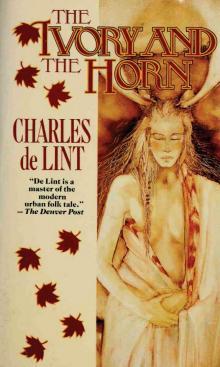 The Ivory and the Horn
The Ivory and the Horn Yarrow
Yarrow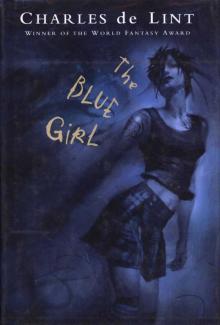 The Blue Girl
The Blue Girl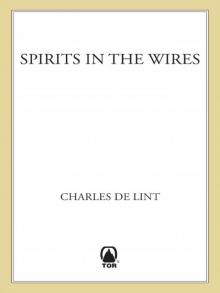 Spirits in the Wires
Spirits in the Wires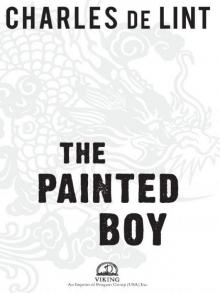 The Painted Boy
The Painted Boy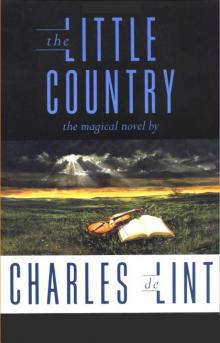 The Little Country
The Little Country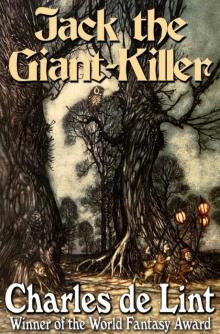 Jack of Kinrowan: Jack the Giant-Killer / Drink Down the Moon
Jack of Kinrowan: Jack the Giant-Killer / Drink Down the Moon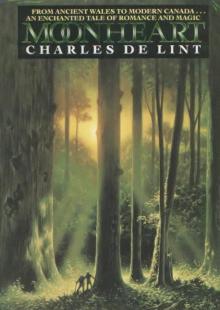 Moonheart
Moonheart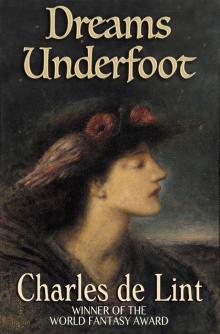 Dreams Underfoot
Dreams Underfoot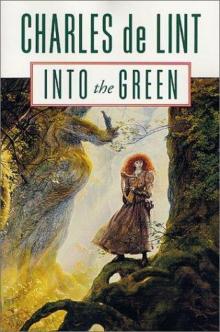 Into the Green
Into the Green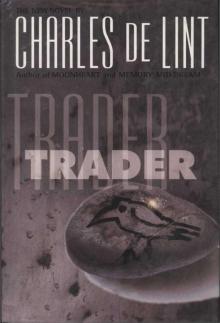 Trader
Trader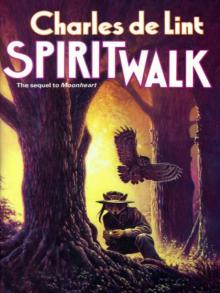 Spiritwalk
Spiritwalk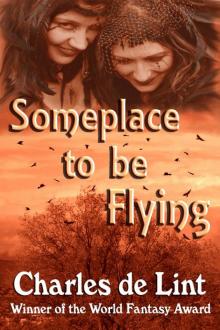 Someplace to Be Flying
Someplace to Be Flying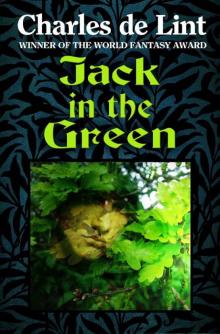 Jack in the Green
Jack in the Green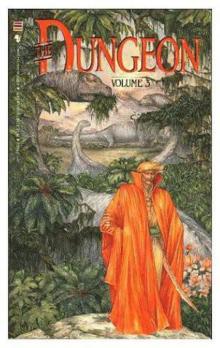 The Valley of Thunder
The Valley of Thunder Out of This World
Out of This World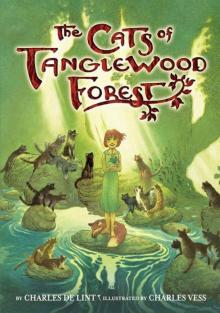 The Cats of Tanglewood Forest
The Cats of Tanglewood Forest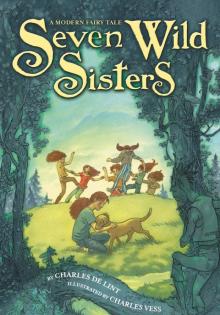 Seven Wild Sisters
Seven Wild Sisters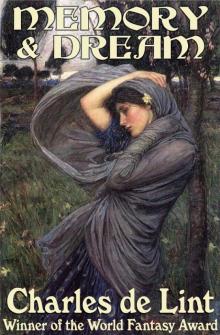 Memory and Dream
Memory and Dream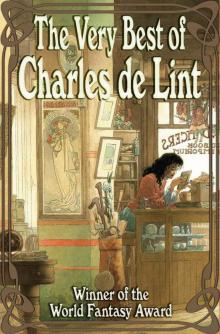 The Very Best of Charles De Lint
The Very Best of Charles De Lint Under My Skin
Under My Skin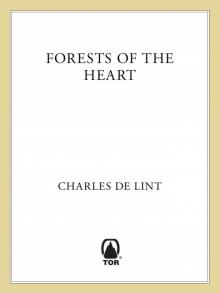 Forests of the Heart
Forests of the Heart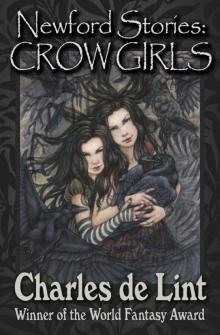 The Newford Stories
The Newford Stories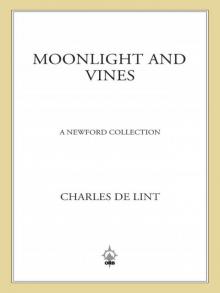 Moonlight and Vines
Moonlight and Vines Angel of Darkness
Angel of Darkness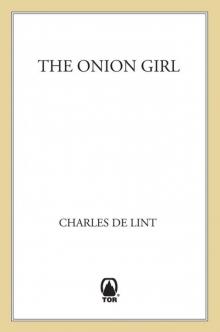 The Onion Girl
The Onion Girl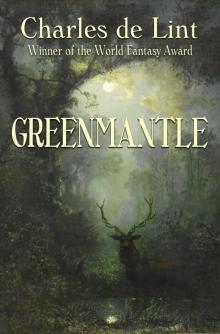 Greenmantle
Greenmantle Waifs And Strays
Waifs And Strays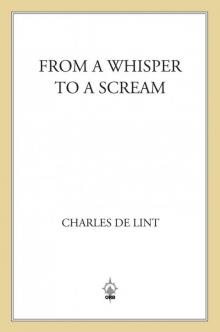 From a Whisper to a Scream
From a Whisper to a Scream Over My Head
Over My Head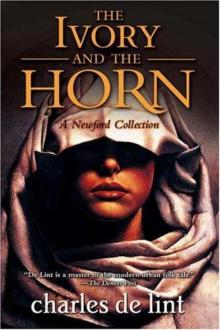 The Ivory and the Horn n-6
The Ivory and the Horn n-6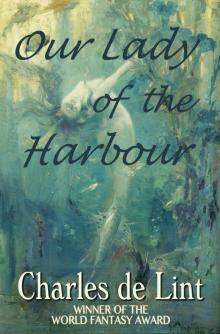 Our Lady of the Harbour
Our Lady of the Harbour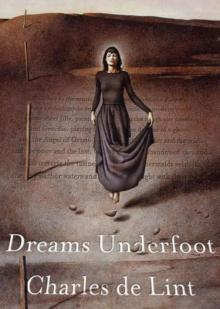 Dreams Underfoot n-1
Dreams Underfoot n-1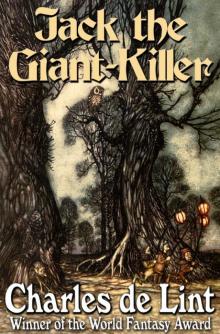 Jack the Giant-Killer (Jack of Kinrowan Book 1)
Jack the Giant-Killer (Jack of Kinrowan Book 1)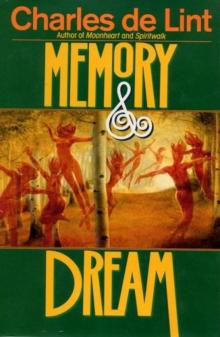 Memory and Dream n-5
Memory and Dream n-5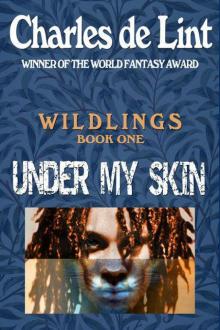 Under My Skin (Wildlings)
Under My Skin (Wildlings)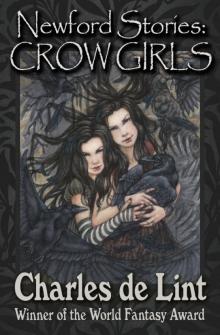 Newford Stories
Newford Stories The Wind in His Heart
The Wind in His Heart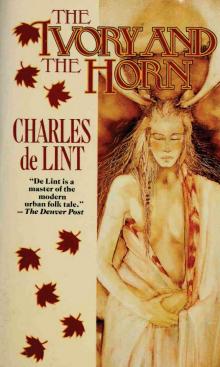 Ivory and the Horn
Ivory and the Horn